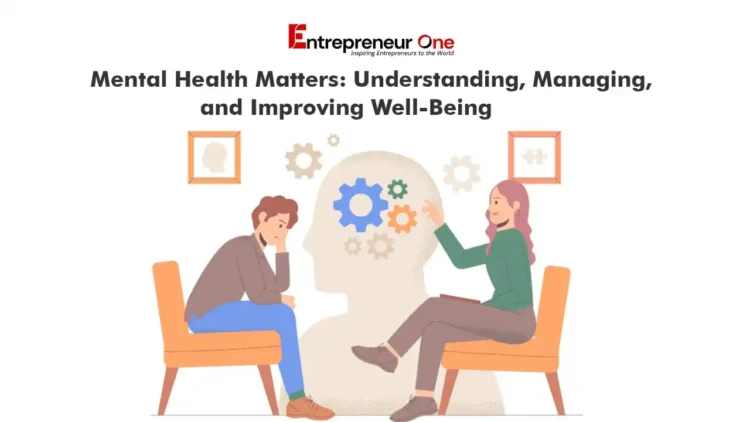Mental health refers to a person’s emotional, psychological, and social well-being. It affects how we think, feel, and and react. It plays a crucial role in our overall quality of life. Mental health is very important in several aspects and regions of our life.
Mental health can be a result of a lot of things happening in our lives. As well as it affects our daily life and our life decisions both emotionally and practically.
IMPORTANCE OF MENTAL HEALTH
Mental health is essential for a lot of things, such as our daily life, our well-being, our productivity, and our relationships.
- Overall Well-being: Mental health affects our physical health, relationships, and daily functioning. If we are mentally ill, we may face a lot of issues while doing our day-to-day work, which will reduce our productivity.
- Resilience: Good mental health helps us cope with our negative emotions and abnormal psychology such as stress, trauma, and adversity. It makes it easier to help us fight these situations and live a healthy life.
- Productivity: Mental health impacts our ability to work, study, and engage in activities we enjoy. It is important to have good mental health in order to do our day-to-day work properly and effectively in a happy state.
- Relationships: Bad mental health may ruin relationships. Mental health affects our relationships with family, friends, our partners, and community because we see what we want to see, and it is the cause of our mental health.
TYPES OF MENTAL HEALTH CONDITIONS
- Anxiety Disorders: Excessive fear, worry, or anxiety that interferes with daily life. Examples include generalized anxiety disorder, panic disorder, and social anxiety disorder. Anxiety can be of several types, which can ruin our mental health with just a touch.
- Mood Disorders: Abnormalities in emotional states, such as depression, bipolar disorder, and mood swings. Mood swings can make us unable to think about the situation more.
- Personality Disorders: Long-lasting patterns of thought and behavior that deviate from cultural norms, such as borderline personality disorder and narcissistic personality disorder. We tend to behave the same or abnormally no matter the situation.
- Psychotic Disorders: Loss of touch with reality, such as schizophrenia and hallucinations. People often daydream and face a feeling of regret when things are not real.
- Trauma and Stress-Related Disorders: Conditions that arise from experiencing traumatic events, such as post-traumatic stress disorder (PTSD). Many people are not treated well in their childhood, which makes them habitual to being afraid and taking everything as traumatic in their lives.
- Neurodevelopmental Disorders: Conditions that affect brain development and function, such as attention deficit hyperactivity disorder (ADHD) and autism spectrum disorder.
CAUSES OF MENTAL HEALTH CONDITIONS
- Genetics: Inheritance of genetic traits that increase the risk of developing mental health conditions. The parent’s behavior affects the child’s behavior too.
- Environmental Factors: Exposure to traumatic events, stress, and social and economic pressures. People get anxious over a lot of things in the environment which makes them have mental issues.
- Brain Chemistry: Imbalances in neurotransmitters, such as serotonin and dopamine, that regulate mood and behavior. Anything in excess is harmful to us, and that is why we should regulate our mental health.
- Medical Conditions: Presence of underlying medical conditions, such as thyroid disorders or chronic pain.
SYMPTOMS OF MENTAL HEALTH CONDITIONS
- Changes in Mood: Persistent feelings of sadness, hopelessness, or irritability. We humans tend to experience a lot in our day-to-day lives, and due to that we face this condition of changes in mood.
- Changes in Behavior: Withdrawal from social activities, changes in appetite or sleep patterns, and difficulty concentrating. We see what we think, and that is why this often happens with us.
- Cognitive Symptoms: Difficulty thinking clearly, making decisions, or remembering things. Sometimes this is because of stress and anxiety. Sometimes it is a disorder in our mental health.
- Physical Symptoms: Headaches, stomach problems, or other physical complaints related to mental health conditions.
DIAGNOSIS AND TREATMENT OF MENTAL HEALTH CONDITIONS
- Diagnosis: Comprehensive evaluation by a mental health professional, including interviews, observations, and psychological assessments.
- Psychotherapy: Talk therapy, such as cognitive-behavioral therapy (CBT) or psychodynamic therapy, to address underlying issues and develop coping strategies.
- Medications: Prescription medications, such as antidepressants or antipsychotics, to manage symptoms and stabilize mood.
- Lifestyle Changes: Healthy habits, such as regular exercise, a balanced diet, and sufficient sleep, to support mental health.
IMPORTANCE OF MENTAL HEALTH AWARENESS
- Reducing Stigma: Promoting understanding and acceptance of mental health conditions to reduce stigma and encourage help-seeking. This will have a positive impact on people’s behavior.
- Early Intervention: Encouraging early detection and treatment of mental health conditions to prevent progression and improve outcomes. If we see something suspicious, we should definitely go and check about the issue before it becomes a big problem.
- Supporting Mental Health: Fostering a supportive environment that promotes mental well-being, resilience, and overall quality of life. Creating a friendly and healthy environment around people may help in understanding mental issues more appropriately.
HOW TO MAINTAIN GOOD MENTAL HEALTH
- Self-care: Engaging in activities that bring joy and relaxation, such as hobbies or spending time with loved ones. We should do what makes us happy in order to maintain a healthy habit and a healthy mind.
- Social Connections: Building and maintaining strong social relationships to support mental health. Being with people heals our inner child and our mental health.
- Healthy Habits: Practicing healthy habits, such as regular exercise, a balanced diet, and sufficient sleep. Eating better and sleeping earlier may help a lot in the renovation of a good mental structure in our body.
- Stress Management: Developing effective coping strategies to manage stress and anxiety. Trying new things but not getting anxious over it is a good move.
- Seeking Help: Reaching out to mental health professionals or support services when needed. If you are in mental pain, you may consult with experts.
COMMON MENTAL HEALTH CHALLENGES
- Anxiety and Depression: Common mental health conditions that can impact daily life. A major population of the world suffers from depression and anxiety.
- Trauma and PTSD: Conditions that arise from experiencing traumatic events. Trauma takes place in childhood, which affects our mental health so much.
- Substance Abuse: Using substances to cope with mental health issues, which can worsen symptoms.
- Relationship Issues: Conflicts with family, friends, or romantic partners that can impact mental health. The world seems apart when we think negatively about our relationships.
MENTAL HEALTH RESOURCES
- Mental Health Professionals: Therapists, counselors, and psychiatrists who provide diagnosis, treatment, and support.
- Support Groups: Online or in-person groups that connect individuals with similar experiences and challenges.
- Hotlines and Helplines: 24/7 services that provide immediate support and guidance.
- Online Resources: Websites, apps, and forums that offer information, tools, and community support.















